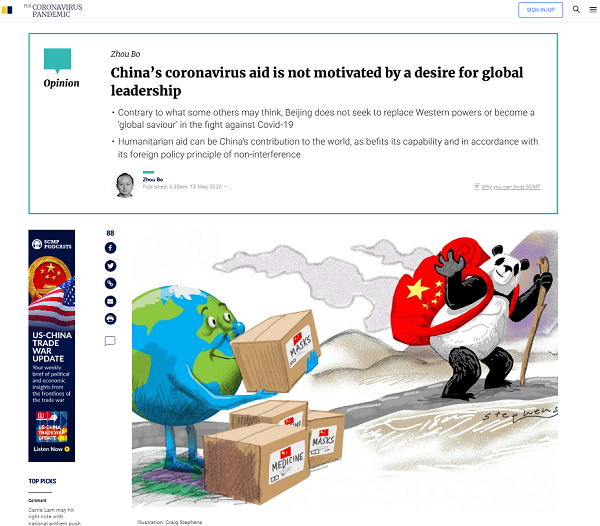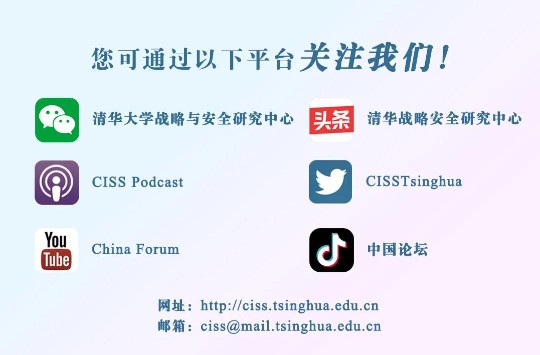周波:清华大学战略与安全研究中心客座研究员、中国论坛特约专家
在这次抗击新冠疫情中,中国的表现可不像是一个发展中国家。据报道,目前中国已经向140多个国家和国际组织提供了各种医疗援助,并向12个国家派遣了共计14支专业医疗团队。中国驻美大使崔天凯表示,截止到4月29日,中国向美国提供的口罩已经达到人均14只。
由于没人知道疫情何时结束,所以这样的援助一定还会继续,因此北京的形象将进一步提高。
但别搞错了:这并不意味着中国想要争夺全球霸主。目前各种说法甚嚣尘上,但恰恰相反,在西方国家忙于控制自己国内疫情之际,中国既没有摆出“全球救世主”的样子,也没有把自己描绘成所谓的“新兴超级大国”。中国表示自己所做的一切不过是在回馈国际社会对中国疫情暴发时提供的援助。

《南华早报》5月13日刊登周波文章《中国的抗疫援助不是为了争当全球霸主》
首先,中国根本没有争夺全球霸主的野心。中国真正的雄心已经载入宪法,即实现“中华民族伟大复兴”。这一漫漫征程长达30年之久,一直要到本世纪中期才能实现,其中每一个发展阶段都有清晰的目标。最能说明中国政府决心的例子莫过于疫情肆虐也没有削弱中国政府确保今年年底前消除绝对贫困的决心。
此外,中国的影响力已经无处不在。如今,在西方定制的国际制度和机构里,中国似乎比美国更加游刃有余。当美国接连退出国际条约和机构之际,中国反而参与更深。
目前,在15个联合国专属机构中,中国人领导了4个涉及经济活动的机构,即粮农组织、国际电信联盟、联合国工业发展组织和国际民用航空组织。
对中国“领导”角色的错误假设,部分原因是人在危机中本能地希望有人出面牵头。2008年金融危机后,大国齐心协力恢复全球经济,并为此召开了20国集团(G20)首届领导人峰会,但这次却悄无声息。
联合国秘书长安东尼奥·古特雷斯本月抱怨,在抗疫过程中全世界缺乏领导者。唐纳德·特朗普似乎是第一位既没有意愿也没有能力领导的美国总统。无需赘言,他宣布停止为世界卫生组织提供资金援助引起世界一片哗然。
中国帮助世界其他国家的最好办法并不是所谓“领导”,而是作为一个负责任的大国提供公共产品。问题是:中国能提供多少?由于人均国内生产总值低于发达国家和地区发展差距较大,中国政府坚持认为中国仍然是一个发展中国家。
但许多西方国家认为,中国已经是世界第二大经济体,是世界上最大的工业制造国,拥有世界上最大的外汇储备,是奢侈品消费量最高的国家,所以不可能是一个发展中国家。2019年,中国人均国内生产总值已经达到了10276美元,与世界银行定义的“高收入国家”的12376美元相差并不遥远。
两种说法都不无道理。但无论中国地位究竟如何,中国政府多次表示将在力所能及的情况下向世界提供援助。近年来,中国的对外援助的确已经大幅增加。
2019年,中国超过日本成为联合国第二大会费国。在特朗普撤回美国对世卫组织的资助后,中国宣布将在此前提供的2000万美元基础上,再提供3000万美元资助世卫组织的抗疫工作。
中国能提供的最好的公共物品是人道主义援助。这种支持是最没有争议的,而且更重要的是,因为中国的外交政策核心是不干涉内政,所以这几乎可以说是为中国量身定做的。中国既没有兴趣取代美国成为“世界警察”,也没有打算将美国赶出印度—太平洋地区。
值得一提的是,无论是维和、打击海盗还是救灾行动,中国在海外的军事行动始终是人道主义性质的。例如,解放军海军的“和平方舟”号医疗船在过去的10年内为43个国家和地区的23万多人提供了医疗服务。
中国提供人道主义援助确有优势。作为“世界工厂”,中国的工业制造能力无与伦比。在冠状病毒暴发之前,很少有中国人——包括我自己在内——意识到全世界居然在防护口罩等最基本的医疗用品方面如此依赖中国。
不难想象,富国今后将尽最大努力提高应对下一次病毒来袭的准备,但是穷国呢?这个需求是巨大的。《纽约时报》报道南苏丹有5名副总统,却只有4台呼吸机,有10个非洲国家连一台呼吸机都没有。
不断攀升的死亡率警示我们,微不可见的病毒可能远比金融危机和大国竞争更加致命。它促使我们重新思考生活中究竟什么对个人、家庭和社会最重要。
这次疫情不会是最后一次。如果中国的援助表明,下一场灾难发生时,它能以这样的力度再次参与,这对全世界而言,可谓至暗时刻的最好消息。
(“中国论坛”武一琪译自《南华早报》,附英文原文)
China's coronavirus aid is not motivated by a desire for global leadership
In fighting the novel coronavirus, China looks like anything but a developing country. It has reportedly provided all kinds of medical supplies to over 140 countries and international organisations and sent 14 medical expert teams to 12 countries. According to Cui Tiankai, the Chinese ambassador to the United States, by April 29, China had provided 14 masks for every American on average.
Since no one knows when the pandemic might end, such assistance is poised to continue. As a result, Beijing’s visibility will only rise.
But make no mistake: this is not a sign of China wresting control of global leadership. Contrary to various allegations, China has not cast itself as a “global saviour” nor portrayed itself as an emerging superpower at a time that countries in the West are struggling to control domestic Covid-19 outbreaks. China has said it was only paying back the support it received when it was hit hard by the virus.
China does not harbour ambitions of global leadership in the first place. Its real ambition, as stated in its constitution, is to realise the “great rejuvenation of the Chinese nation”. China has pledged a 30-year long march to achieve this by mid-century, with clearly defined goals at different stages.
The most telling example of its resolve is that even the pandemic has not dented the government’s commitment to eliminate extreme poverty by the end of this year.
Besides, Beijing’s influence is already ubiquitous. Today, it appears more comfortable than Washington with the international regimes and institutions that are designed by the West. While Americans have withdrawn from international treaties and institutions one after another, the Chinese have stepped in.
Chinese nationals now head four of the 15 specialised United Nations agencies that deal with economic activity, namely the Food and Agriculture Organisation, the International Telecommunications Union, the UN Industrial Development Organisation, and the International Civil Aviation Organisation.
The incorrect assumption about China’s “leadership” role has been made partly because of the natural instinct to look for leadership in a crisis. In 2008, major powers worked together to restore the global economy in the wake of the financial crisis, convening the inaugural G20 leaders’ summit for this purpose. Not this time.
UN Secretary General Antonio Guterres fretted this month that there was a lack of leadership in the fight against Covid-19. Donald Trump appears to be the first American president who has neither the wish nor the ability to lead. Needless to say, his decision to halt funding for the World Health Organisation has sparked a global outcry.
The best way China can help the rest of the world is not to “lead”, but to provide public goods as a responsible power. The question is: how much can China provide? Citing its lower per capita GDP than that of developed nations and substantial regional differences in development, the Chinese government maintains that China is still a developing country.
But many in the West argue that the world’s second-largest economy, top manufacturer, holder of the world’s largest foreign exchange reserves and the biggest buyer of luxury goods cannot be a developing country. In 2019, China’s per capita GDP reached US$10,276, not that far from the US$12,376 of a “high-income economy” as defined by the World Bank.
There is a grain of truth in both statements. Whatever its status, the Chinese government has repeatedly said it would offer the world assistance in line with its actual strength. Indeed, its external aid has increased substantially in recent years.
In 2019, China overtook Japan to become the second-largest monetary contributor to the UN. After Trump withdrew US support for the WHO, China announced it would provide another US$30 million to fund the agency’s Covid-19 work, on top of the US$20 million it gave earlier.
The best public goods China can provide is humanitarian aid. Such support is the least controversial and, more importantly, almost tailor-made for China, whose foreign policy is anchored on non-interference. China has no appetite to replace the US as the “world’s cop” nor displace it in the Indo-Pacific region.
Notably, Chinese military operations overseas have been invariably humanitarian in nature, be it peacekeeping, counter-piracy or disaster relief. The PLA Navy’s hospital ship Ark Peace, for example, has provided medical services to over 230,000 people in 43 countries and regions in its 10 years of service.
And China is in a good position to provide humanitarian assistance. As the “world’s factory”, its industrial manufacturing capability is next to none. Before the coronavirus outbreak, very few Chinese – including me – realised how heavily the world depends on China for most basic medical supplies such as protective masks.
One can imagine that rich countries will do their utmost to improve their readiness for another virus attack, but what about poor nations? The need is massive. As The New York Times puts it, South Sudan has five vice-presidents and four ventilators, and 10 African countries have no ventilators at all.
The rising global death toll reminds us that an invisible pathogen can be far more lethal than a financial crisis or major power competition. It pushes us to rethink what is most important in life, not only for oneself, but also for families and societies.
This pandemic won’t be the last. If China’s assistance signals how it could again step in, come the next disaster, it is the best news for the world at the worst time.
本文英文5月13日首发于《南华早报》,中译文5月14日首发于观察者网

